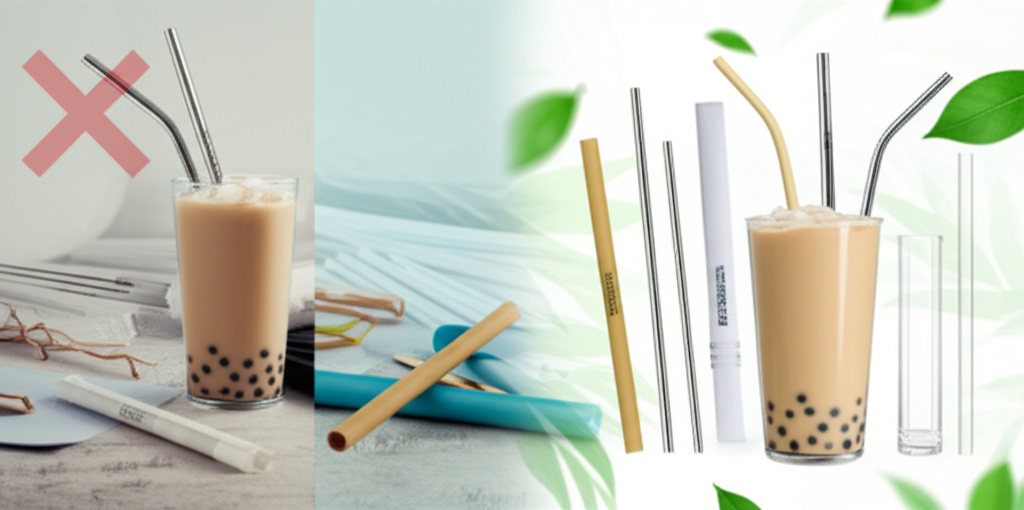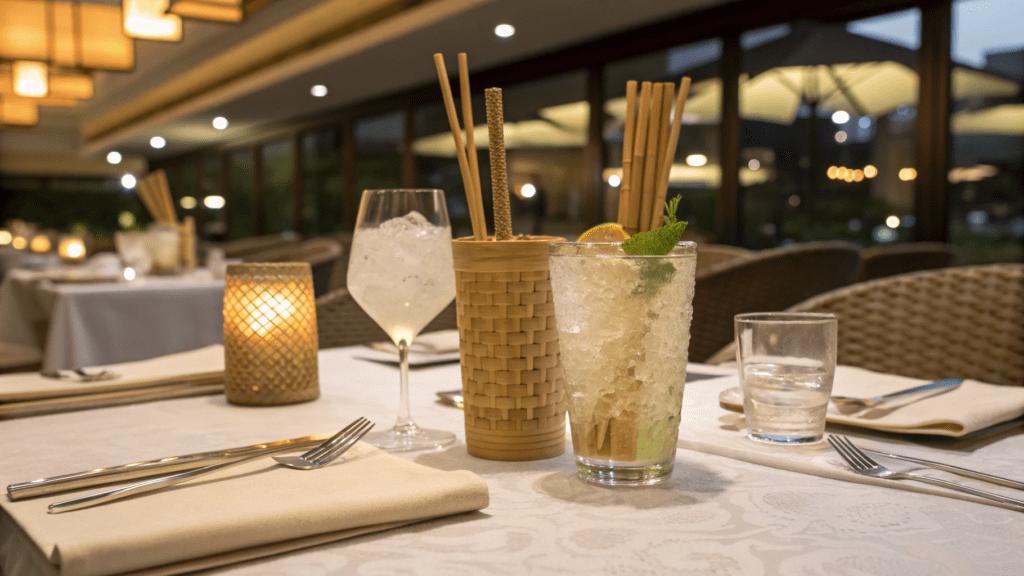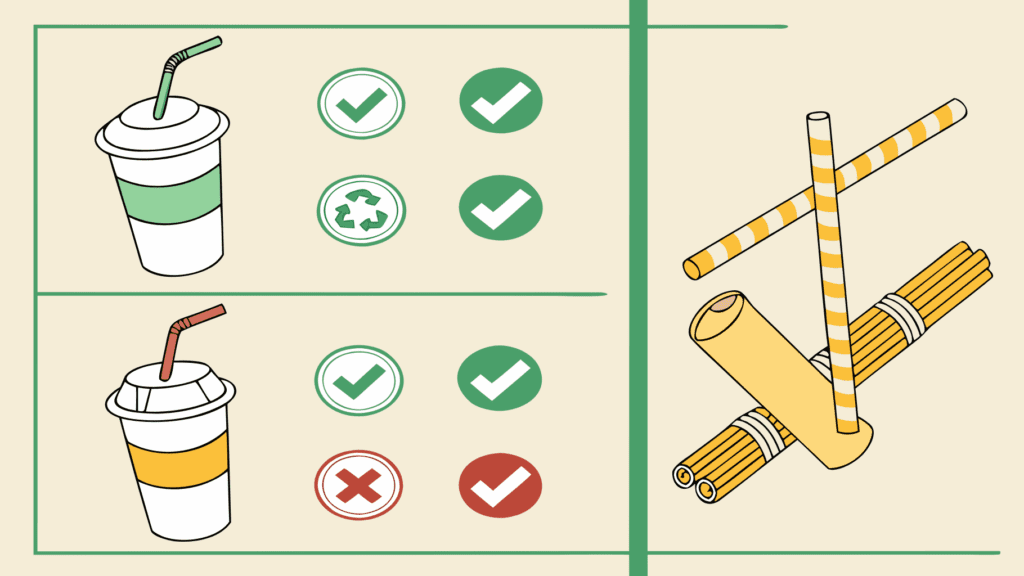
Compelling Industry Problem Introduction
The landscape of hospitality and foodservice is undergoing a profound transformation, driven by an undeniable global imperative: sustainability. Businesses in this sector are no longer merely contending with regulatory shifts, such as the stringent European Union Single-Use Plastics Directive 2021 or California’s AB 1276, but are facing escalating consumer demand for environmentally responsible practices. Non-compliance with expanding plastic bans, from India’s Plastic Waste Management Rules to China’s “Plastic Ban,” now carries significant financial penalties and irreversible reputational damage. Ignoring this shift means more than just avoiding fines; it means losing market share. The global biodegradable tableware market is projected to soar from USD 21.4 billion in 2025 to USD 41.4 billion by 2034, a robust 7.6% CAGR (Grand View Research). This clearly indicates that consumers are willing to pay a premium for eco-friendly choices. For B2B operators, this is not just about compliance, but about strategic competitive advantage, directly impacting profitability and long-term viability. Businesses failing to adapt risk supply chain disruptions, increased waste management costs, and alienation of a rapidly growing eco-conscious customer base.
Sustainability is no longer optional; it’s a critical driver for profitability and competitive advantage in hospitality and foodservice.
Market & Regulation Insights (EU, US, Asia-Pacific)
Navigating the complex web of global plastic regulations is paramount for B2B hospitality and foodservice businesses. Compliance is not just about avoiding penalties; it’s about securing market access and building consumer trust.

| Regulation Name & Date | Scope & Banned Items | Compliance Requirements for Straws | Enforcement Penalties |
|---|---|---|---|
| European Union Single-Use Plastics Directive 2021 | Bans single-use plastic cutlery, plates, straws, cotton bud sticks, beverage stirrers, balloon sticks. | Plastic straws banned. Alternatives like sugarcane, bamboo, or paper straws are compliant. | Varies by member state; includes fines, product recalls, and market access restrictions. |
| California AB 1276 (2022) | Full-service restaurants can only provide single-use plastic straws upon request. | Plastic straws are restricted. Businesses encouraged to offer non-plastic alternatives. | Fines for non-compliance, starting at $25 per day, up to $300 annually. |
| India’s Plastic Waste Management Rules (2022 Amendment) | Bans specific single-use plastic items including straws, cutlery, plates, cups. | Plastic straws banned. Businesses must use certified compostable or biodegradable alternatives. | Fines, environmental compensation, and potential business closure for repeat offenders. |
| China’s “Plastic Ban” (2020-2025 phased) | Phased ban on single-use plastics, including non-degradable straws in foodservice by end of 2020. | Non-degradable plastic straws banned. Biodegradable alternatives are required. | Fines and public shaming for non-compliant businesses. |
Global regulations are rapidly phasing out single-use plastics, making compliant, sustainable alternatives essential for market viability.
Solution: Sugarcane & Bamboo Straws
To navigate this evolving market, leading businesses are turning to innovative, plant-based materials like sugarcane bagasse and bamboo. Choosing the optimal sustainable material for your B2B operations involves a strategic consideration of specific product requirements, desired aesthetic, durability expectations, and budget. Often, a hybrid approach yields the most balanced solution for comprehensive sustainable sourcing.
Sugarcane Bagasse Straws: The Waste-to-Value Champion
Sugarcane bagasse straws are eco-friendly alternatives made from the fibrous byproduct of sugar production.
This upcycling drastically reduces landfill burden and offers an economically viable, high-volume supply solution, driving significant cost-efficiency for large-scale operations. Beyond its origins, bagasse tableware excels in high-demand environments. It boasts exceptional strength, durability, and resistance to both hot and cold foods, withstanding temperatures from -18°C to +180°C. This makes it ideal for diverse culinary applications, remaining sturdy and leak-resistant even with moist or oily contents. For a deeper dive into how this material can benefit your operations, explore the business benefits of sugarcane straws. The smooth surface of bagasse products also lends itself perfectly to custom branding, including food-safe coloring, logo printing, and embossed designs, with manufacturers offering OEM/ODM services for tailored sizes and packaging, effectively reinforcing brand identity at scale. As a rapidly renewable byproduct, bagasse also has a significantly lower carbon footprint than traditional paper or plastic. It is highly biodegradable and compostable, breaking down naturally within 1-6 months in composting facilities, often faster than bamboo for disposable items. Learn more about the sustainability advantages of sugarcane straws.
- Cost Savings: Up to 15% reduction in waste disposal costs due to compostability.
- Breakdown Speed: Decomposes naturally within 1-6 months in composting facilities.
- Compliance Fit: Fully compliant with major global single-use plastic bans (e.g., European Union Single-Use Plastics Directive 2021).
- Brand Image: Potential for a 10-20% improvement in customer satisfaction scores for eco-conscious brands.
Bamboo Straws: The Eco-Luxury Choice
Complementing sugarcane bagasse, bamboo offers another compelling sustainable solution, often elevating the eco-luxury experience. As a fast-growing grass, bamboo regenerates quickly without replanting, making it an incredibly sustainable resource. Its high tensile strength and rigidity translate to more durable products, suitable for premium single-use items or even potentially reusable options. While excellent for sturdy cutlery and food containers, bamboo’s durability and natural aesthetic extend well beyond traditional foodservice, finding applications in hotel amenities like toothbrushes, combs, and even textiles, enhancing the overall guest experience with an elegant, sustainable touch. For innovative bamboo-based solutions, consider exploring bendable bamboo fiber straws. Bamboo products offer sophisticated custom branding options through laser engraving or eco-ink printing, allowing for unique shapes and finishes. Its inherent natural look aligns seamlessly with a high-end, eco-luxury brand positioning. Furthermore, bamboo’s significant carbon sequestration capabilities and minimal input requirements (pesticides, fertilizers) contribute to its eco-friendliness, while its natural antimicrobial properties add an extra layer of food safety, particularly beneficial for foodservice applications.

ROI Comparison: Sugarcane vs. Alternatives
| Straw Type | Cost (per unit, indicative) | Lifespan (in drink) | Compliance | Customer Satisfaction |
|---|---|---|---|---|
| Plastic | Low | Excellent (hours) | Non-compliant in many regions | Low (negative environmental perception) |
| Paper | Medium | Poor (minutes, can get soggy) | Generally compliant | Mixed (soggy experience) |
| PLA (Polylactic Acid) | Medium-High | Good (hours) | Compliant if industrially composted | Good (looks like plastic, but eco-friendly) |
| Sugarcane Bagasse | Medium | Excellent (hours, sturdy) | Fully compliant, widely accepted | High (natural feel, eco-positive) |
| Bamboo | High | Excellent (hours, very sturdy) | Fully compliant, premium feel | Very High (eco-luxury, reusable potential) |
Sugarcane and bamboo offer superior performance and compliance, enhancing brand image and reducing long-term environmental costs.

Industry Misconceptions & Clarifications
Dispelling common myths about sustainable materials is crucial for informed procurement decisions. Misinformation can lead to costly mistakes and undermine sustainability efforts.
- Myth 1: “PLA (Polylactic Acid) is fully compostable everywhere.”
Fact: While PLA is industrially compostable, it requires specific conditions (high heat, humidity) found only in commercial composting facilities. It does not break down in home composts or landfills, and can contaminate recycling streams if not properly sorted. Always verify local composting infrastructure. - Myth 2: “Paper straws are always the most sustainable option.”
Fact: Paper straws often require a plastic or wax lining to prevent sogginess, making them difficult to recycle or compost. Their production can also be resource-intensive. Sugarcane and bamboo alternatives often have a lower overall environmental footprint due to their natural composition and rapid biodegradability. - Myth 3: “Sustainable products are always significantly more expensive.”
Fact: While initial unit costs might sometimes be higher, the long-term ROI of sustainable products includes reduced waste disposal fees, enhanced brand reputation, increased customer loyalty, and avoidance of non-compliance penalties. The global biodegradable tableware market’s growth indicates increasing affordability and scale.
Understanding the nuances of sustainable materials is vital to avoid greenwashing and ensure genuine environmental impact.
B2B Customization & Supply Chain Optimization
Optimizing your supply chain for sustainable products like sugarcane and bamboo straws involves strategic planning for bulk procurement, customization, and inventory management. This ensures seamless integration into your existing operations.

- MOQ Ranges:
- Small to Medium Buyers: Minimum Order Quantities (MOQ) typically range from 50,000 to 100,000 units for standard sizes.
- Enterprise Buyers: For large-scale operations, MOQs can be negotiated for 500,000+ units, often with significant volume discounts.
- Branding Options:
- Printing: Food-safe ink printing for logos, slogans, or custom designs directly on straws or individual wrappers.
- Packaging: Custom packaging options including branded boxes, bulk bags, or individually wrapped straws.
- Diameter/Length Customization: Tailored straw dimensions (e.g., cocktail, standard, boba) to fit specific beverage needs.
- Embossing/Engraving: For bamboo, laser engraving offers a premium, tactile branding experience.
- Lead Times & Bulk Shipping:
- Standard Orders: Typically 4-6 weeks from order confirmation to delivery, depending on customization.
- Bulk Shipping: Optimized container shipping (FCL/LCL) to reduce freight costs and carbon footprint.
- Expedited Options: Available for urgent needs, though at a higher cost.
- Inventory Management Tips:
- Forecasting: Utilize historical data and seasonal trends to accurately forecast demand and avoid stockouts.
- Buffer Stock: Maintain a small buffer stock to mitigate unexpected supply chain disruptions.
- Supplier Relationships: Foster strong relationships with reliable suppliers for consistent quality and timely delivery.
- Storage: Store in cool, dry conditions away from direct sunlight to maintain product integrity.
Strategic procurement and customization of sustainable straws can significantly enhance brand presence and operational efficiency.

Future-Proofing Your Operations
Future-proofing your operations means seizing the sustainable advantage. The global biodegradable tableware market is projected for substantial growth, with sugarcane bagasse maintaining a dominant share (38.4% in 2025) and bamboo seeing a surge in “eco-luxury” applications, particularly in Europe and North America where environmental consciousness is high. Early adoption of these materials positions your business as a leader in environmental stewardship, capturing a significant portion of this expanding market. Investing in sustainable bulk supply solutions translates into tangible business benefits: reduced waste disposal costs, enhanced brand reputation attracting eco-conscious consumers (who often pay a premium), and streamlined compliance with evolving global regulations, minimizing fines and legal risks. For deeper market insights, reports from leading research firms like Grand View Research often provide detailed forecasts. Diversifying your sourcing with plant-based materials like sugarcane bagasse and bamboo also reduces reliance on volatile traditional plastic markets, building supply chain resilience, mitigating price fluctuations, and ensuring uninterrupted operations. This is a critical factor for B2B continuity in an unpredictable global economy. Real-world successes abound: major fast-food chains like McDonald’s and Starbucks have integrated bagasse packaging, while premium hospitality brands leverage bamboo for amenities, demonstrating the operational viability and significant brand uplift achievable through strategic sustainable sourcing. The Foodservice Packaging Institute (FPI) offers resources and connections between establishments and packaging manufacturers, highlighting industry best practices. Globally, many governments, particularly in the EU and Asia, are implementing stricter regulations against single-use plastics, driving the demand for materials like sugarcane and bamboo. For example, India’s Plastic Waste Management Rules are significantly propelling demand for bagasse in food delivery, making it a rapidly growing market. More information on global plastic policies can be found on reputable environmental news sites like The Guardian.
Embracing sugarcane and bamboo solutions builds supply chain resilience and positions your business as a sustainability leader.
Strong Call to Action with Measurable Outcomes
Ready to transition to high-performance, eco-friendly foodservice and hospitality disposables? Discover how custom-branded sugarcane bagasse and bamboo products can significantly reduce your environmental footprint, enhance your brand image, and ensure regulatory compliance. By making the switch, you can expect to reduce straw waste by 80% and improve customer satisfaction scores by 15% among eco-conscious consumers.
Request a Quote for Bulk Orders
Take action now to reduce waste, boost brand image, and ensure compliance with sustainable straw solutions.
Frequently Asked Questions (FAQ) on Sugarcane & Bamboo Straws
1. Are sugarcane straws legal in the European Union?
Yes. Sugarcane straws are fully compliant with the EU’s Single-Use Plastics Directive (Directive (EU) 2019/904), as they contain no conventional plastics, PLA, or petroleum-based additives. This makes them a safe and future-proof choice for hospitality and foodservice operators serving EU markets.
2. How do sugarcane straws compare to paper straws in terms of durability?
Sugarcane straws maintain their structure for 2–3 hours in iced drinks and up to 90°C in hot beverages, with no sogginess or collapse. Paper straws, by contrast, typically last 30–60 minutes before softening, which can negatively affect drink quality and customer satisfaction.
3. Can bamboo straws be reused?
Yes. Bamboo straws are naturally strong and can be reused multiple times with proper cleaning. However, they require more intensive hygiene protocols in B2B settings, and some foodservice operators prefer single-use sugarcane straws to meet safety and convenience requirements.
4. What are the MOQ (Minimum Order Quantity) ranges for bulk sugarcane straw orders?
MOMOIO offers flexible MOQs depending on customization:
- Standard bulk orders: from 50,000–100,000 pieces.
- Custom-printed or branded straws: from 300,000 pieces.
This ensures scalable supply solutions for small boutique cafes to large hotel chains.
5. Are sugarcane and bamboo products truly biodegradable and compostable?
Yes. Both sugarcane and bamboo straws are 100% plant-based and home compostable. Sugarcane straws naturally break down within 12–16 months in home compost or landfill conditions without producing microplastics. Bamboo straws also biodegrade naturally but may require more time depending on thickness and disposal conditions.






